Employment Law Attorney Resume Examples

Jul 18, 2024
|
12 min read
Craft a winning employment law attorney resume that stands out to hiring managers. Learn how to highlight your legal expertise, courtroom savvy, and negotiation skills while putting your best case forward.
Rated by 348 people
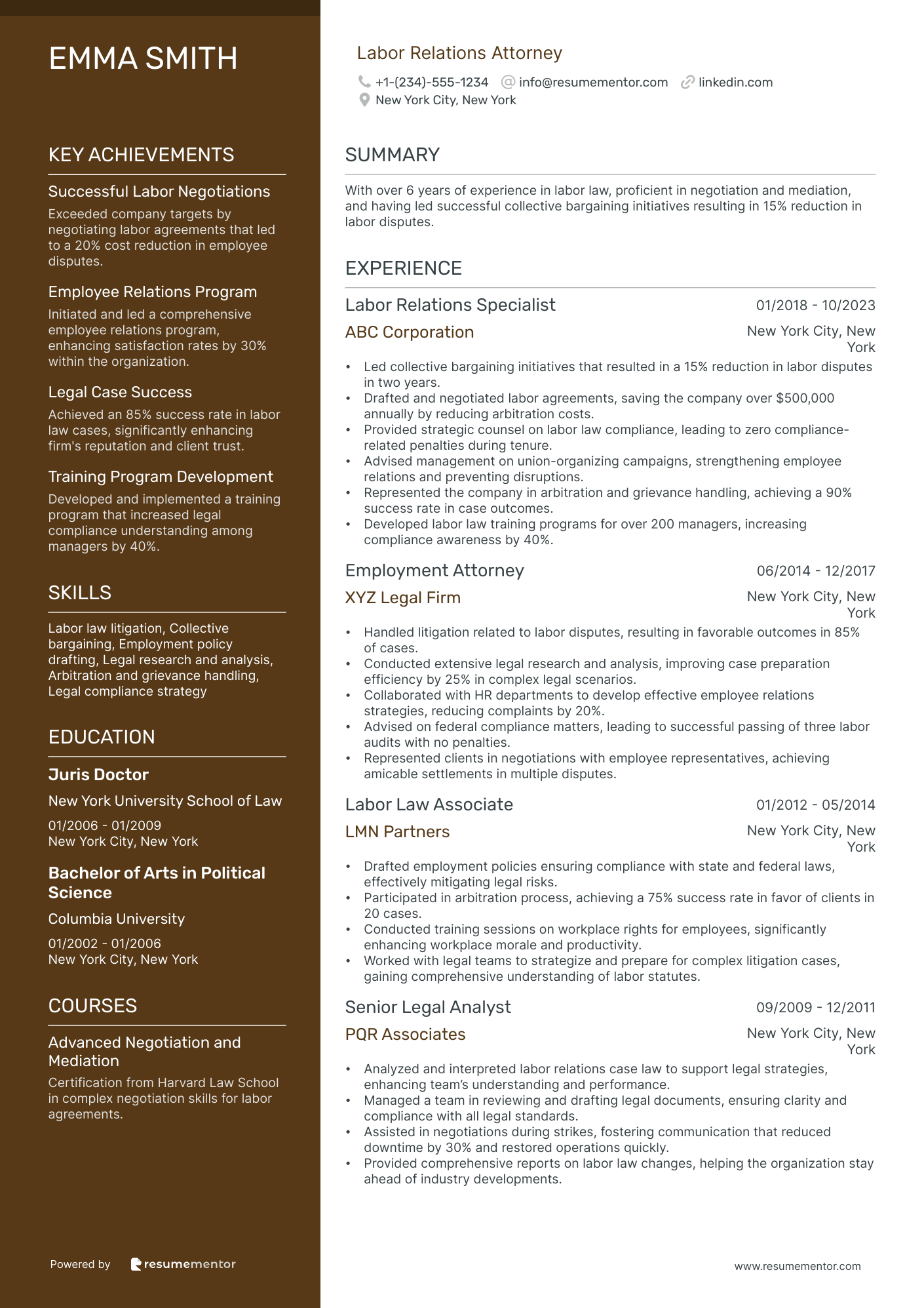
Labor Relations Attorney
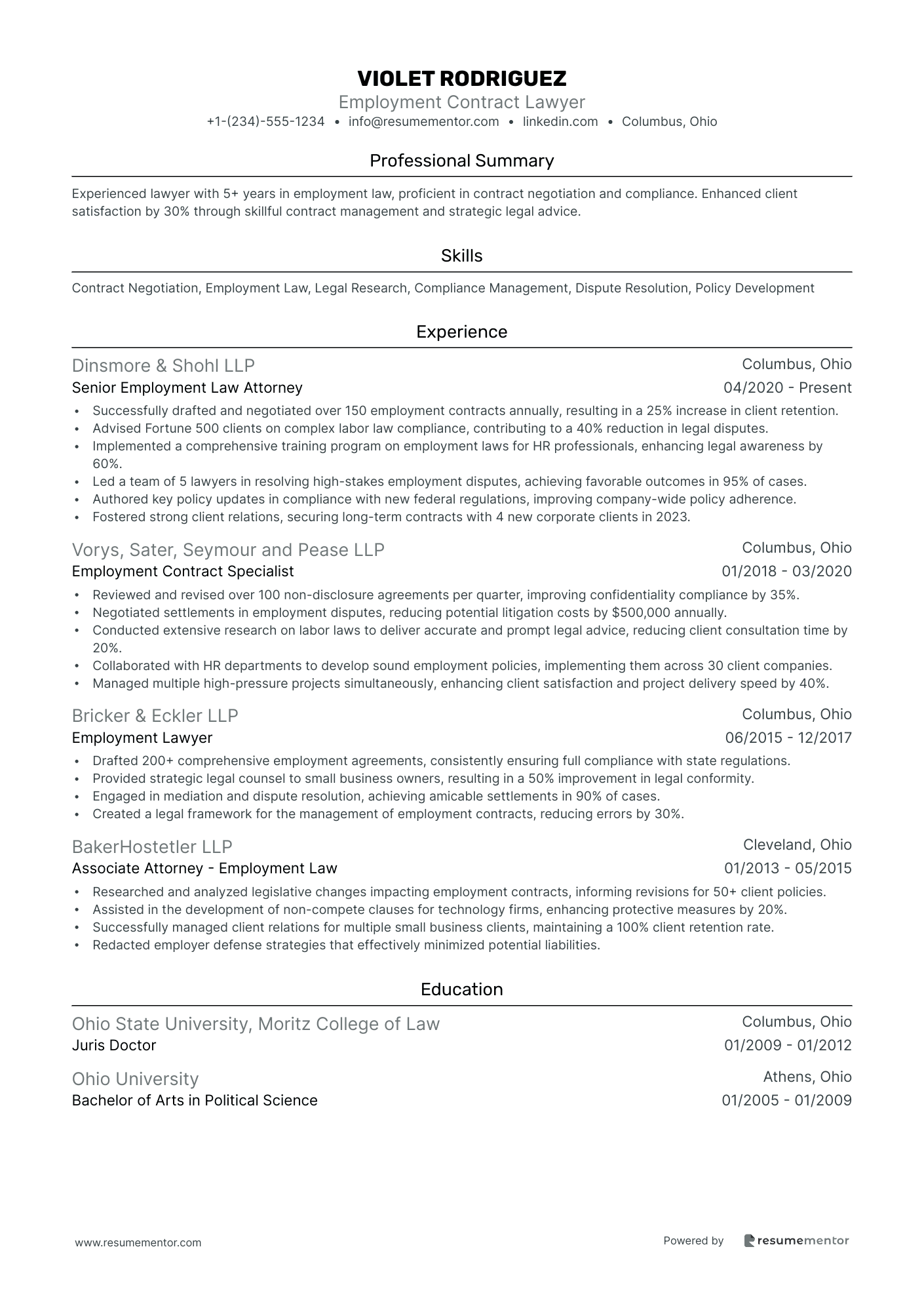
Employment Contract Lawyer
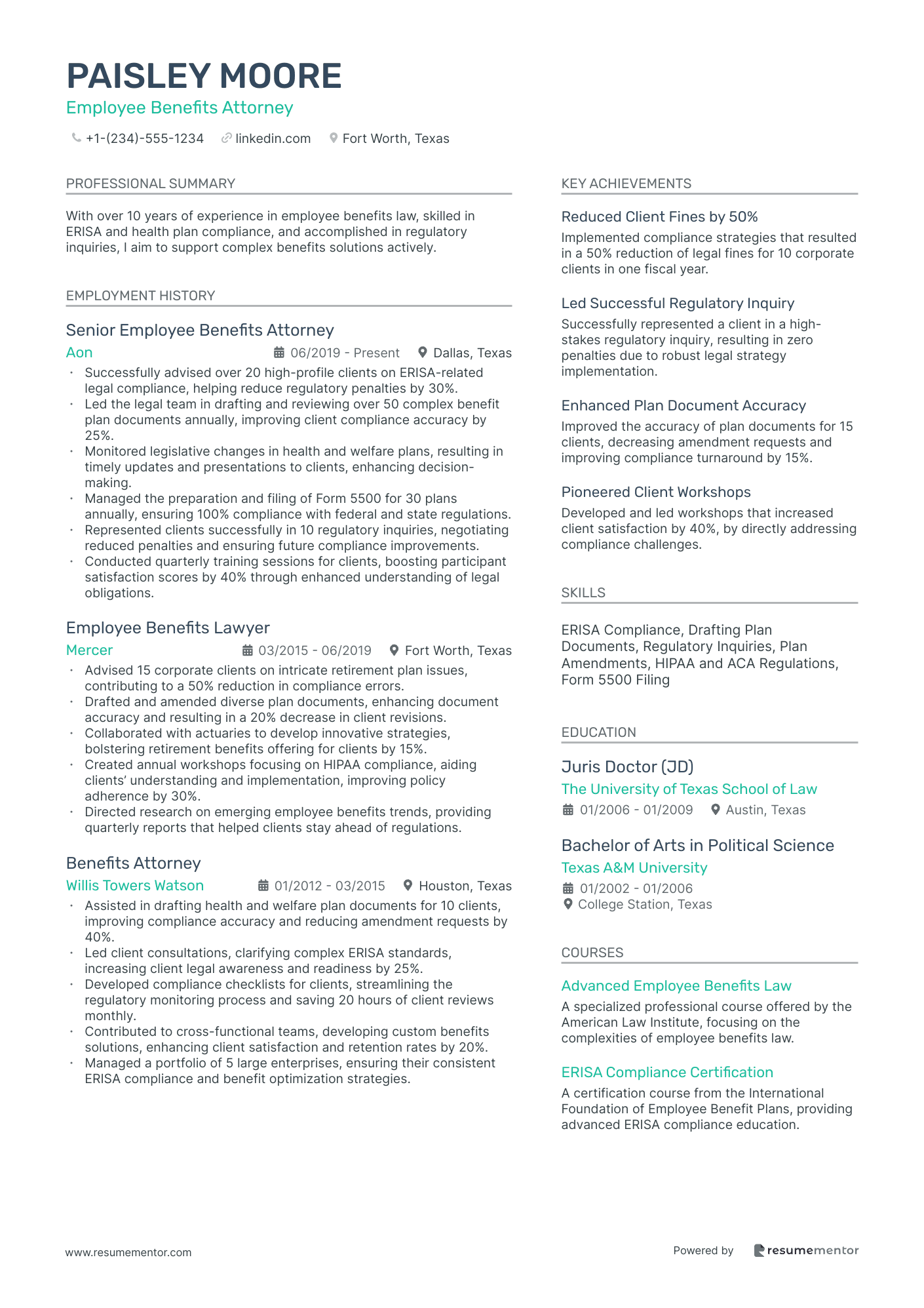
Employee Benefits Attorney
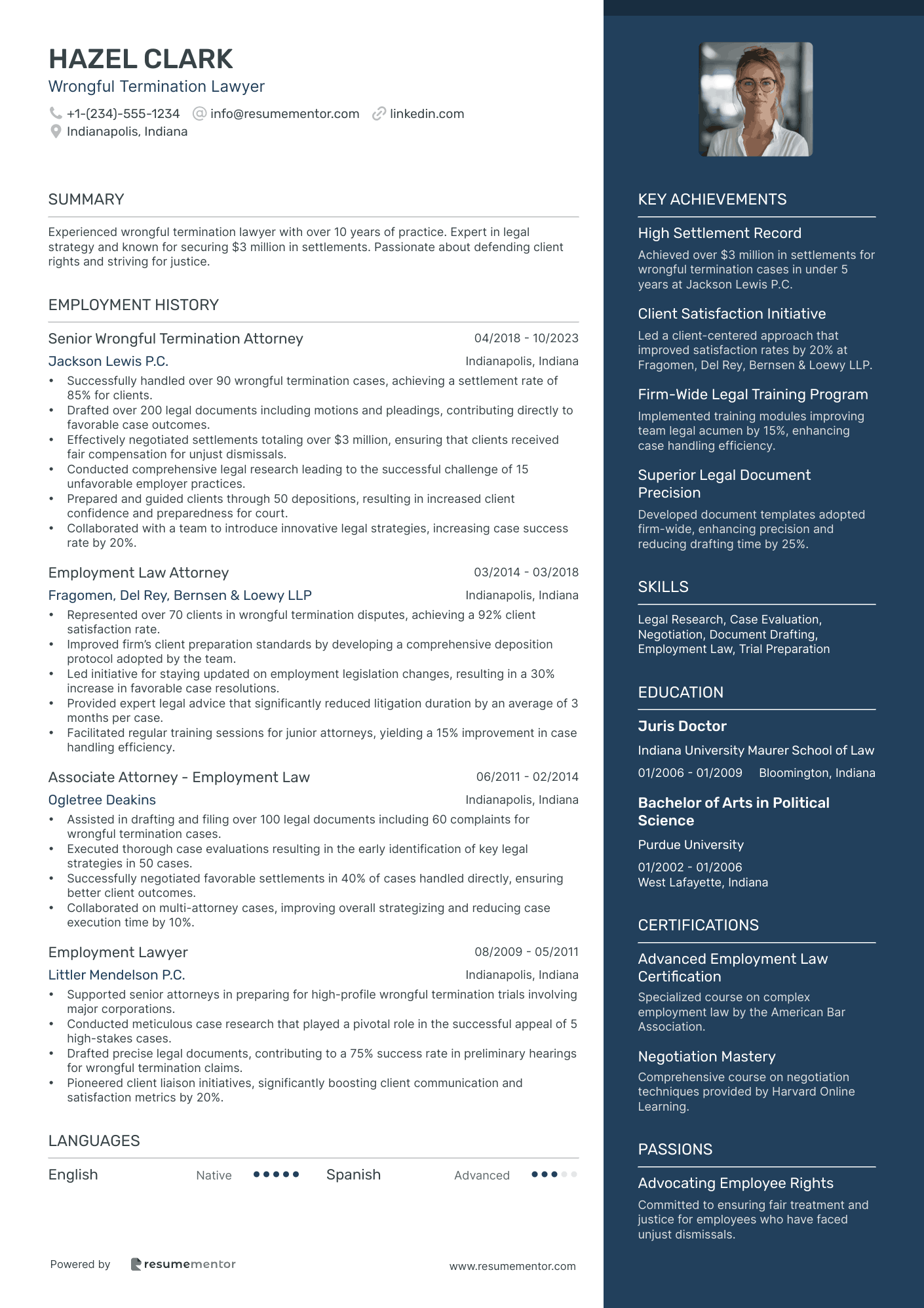
Wrongful Termination Lawyer
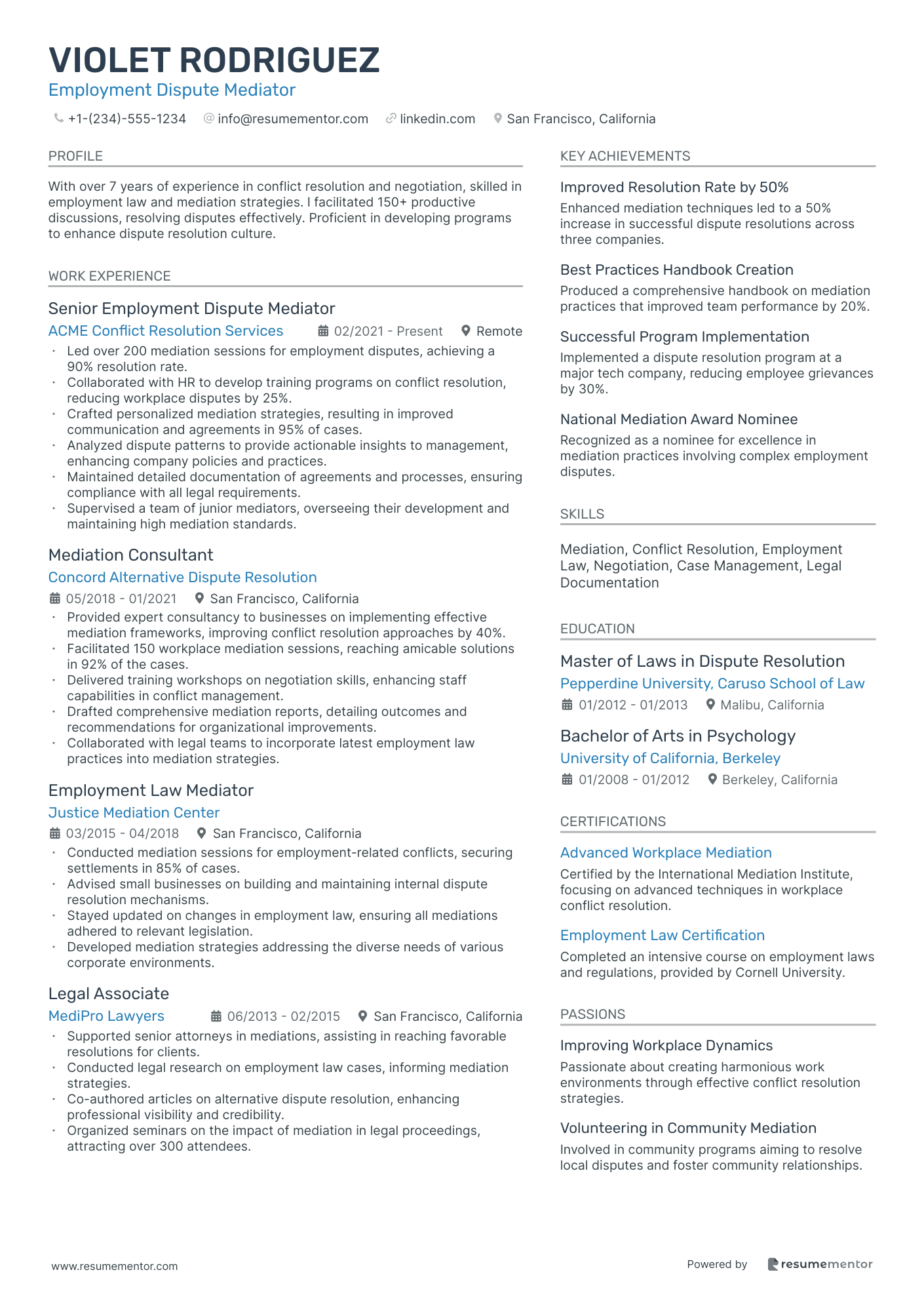
Employment Dispute Mediator
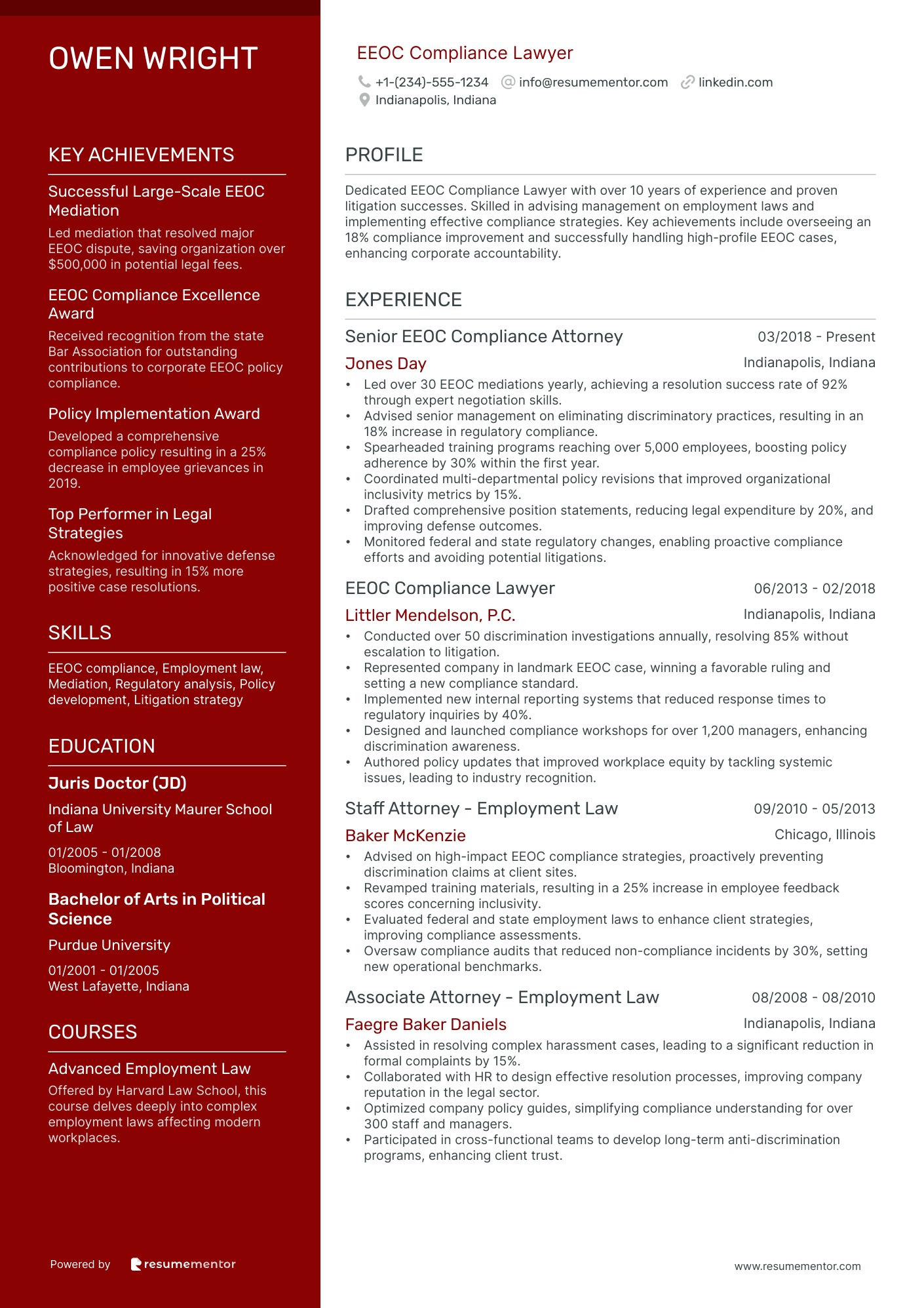
EEOC Compliance Lawyer
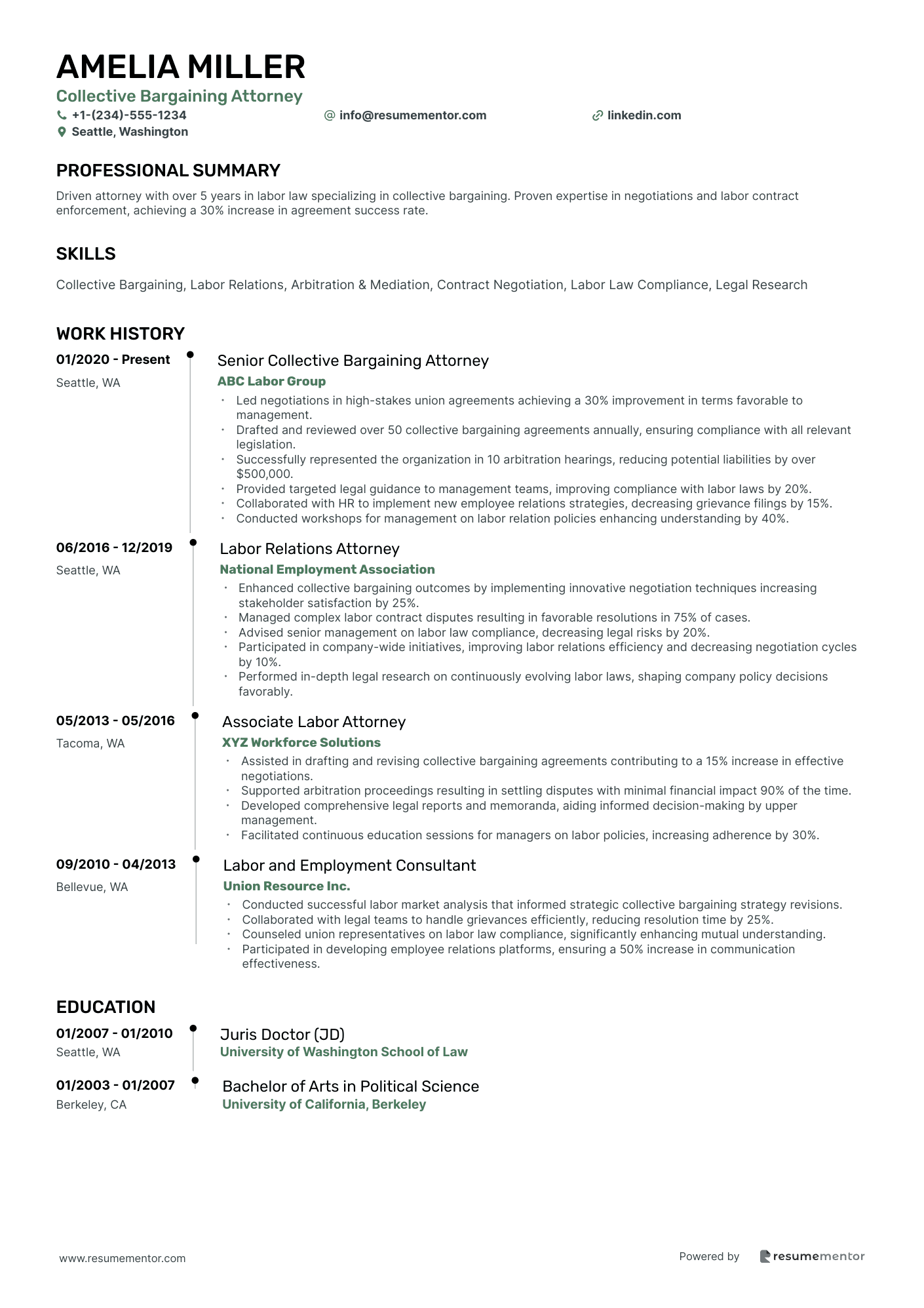
Collective Bargaining Attorney
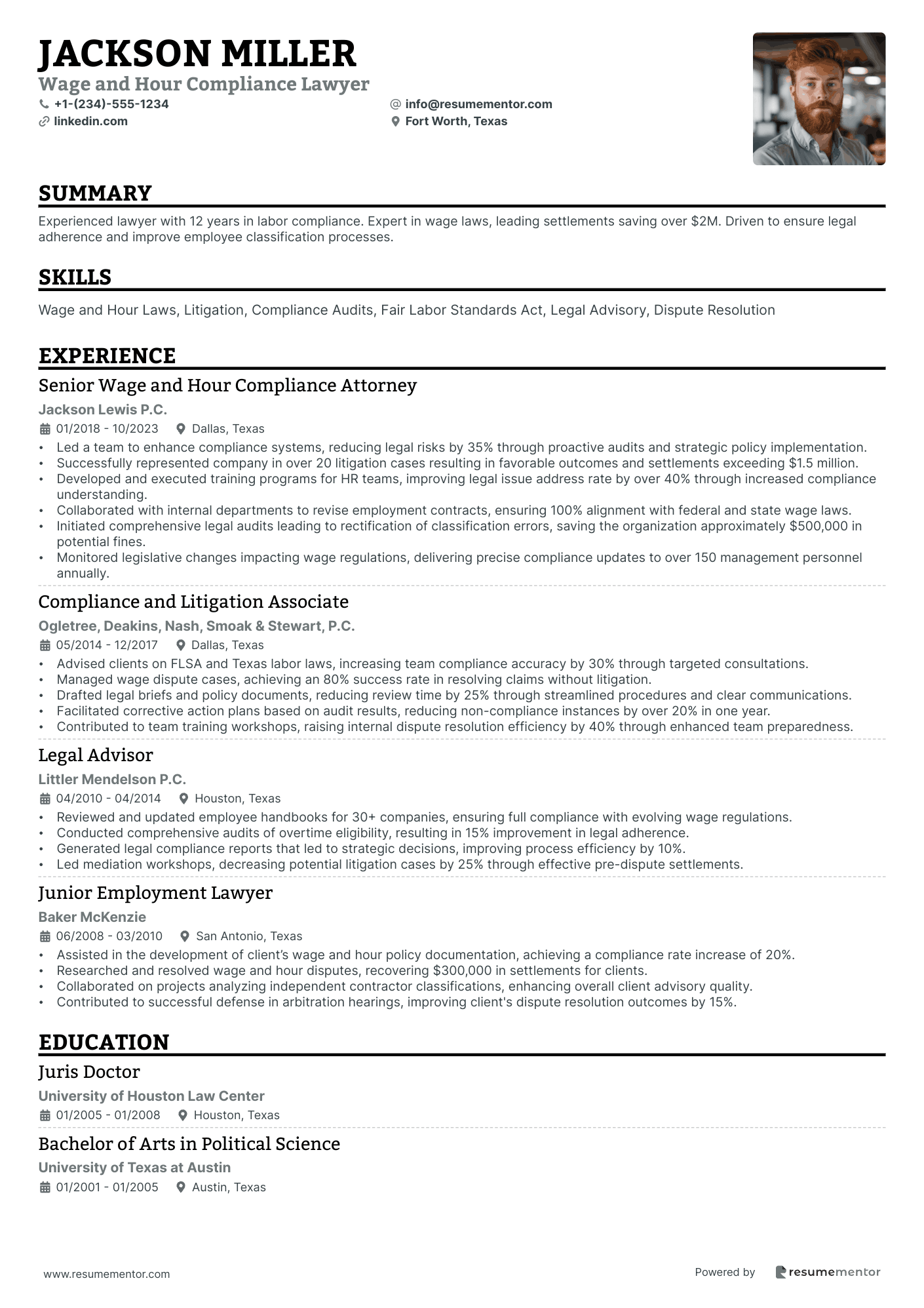
Wage and Hour Compliance Lawyer

Labor Relations Attorney resume sample
- •Led collective bargaining initiatives that resulted in a 15% reduction in labor disputes in two years.
- •Drafted and negotiated labor agreements, saving the company over $500,000 annually by reducing arbitration costs.
- •Provided strategic counsel on labor law compliance, leading to zero compliance-related penalties during tenure.
- •Advised management on union-organizing campaigns, strengthening employee relations and preventing disruptions.
- •Represented the company in arbitration and grievance handling, achieving a 90% success rate in case outcomes.
- •Developed labor law training programs for over 200 managers, increasing compliance awareness by 40%.
- •Handled litigation related to labor disputes, resulting in favorable outcomes in 85% of cases.
- •Conducted extensive legal research and analysis, improving case preparation efficiency by 25% in complex legal scenarios.
- •Collaborated with HR departments to develop effective employee relations strategies, reducing complaints by 20%.
- •Advised on federal compliance matters, leading to successful passing of three labor audits with no penalties.
- •Represented clients in negotiations with employee representatives, achieving amicable settlements in multiple disputes.
- •Drafted employment policies ensuring compliance with state and federal laws, effectively mitigating legal risks.
- •Participated in arbitration process, achieving a 75% success rate in favor of clients in 20 cases.
- •Conducted training sessions on workplace rights for employees, significantly enhancing workplace morale and productivity.
- •Worked with legal teams to strategize and prepare for complex litigation cases, gaining comprehensive understanding of labor statutes.
- •Analyzed and interpreted labor relations case law to support legal strategies, enhancing team’s understanding and performance.
- •Managed a team in reviewing and drafting legal documents, ensuring clarity and compliance with all legal standards.
- •Assisted in negotiations during strikes, fostering communication that reduced downtime by 30% and restored operations quickly.
- •Provided comprehensive reports on labor law changes, helping the organization stay ahead of industry developments.
Employment Contract Lawyer resume sample
- •Successfully drafted and negotiated over 150 employment contracts annually, resulting in a 25% increase in client retention.
- •Advised Fortune 500 clients on complex labor law compliance, contributing to a 40% reduction in legal disputes.
- •Implemented a comprehensive training program on employment laws for HR professionals, enhancing legal awareness by 60%.
- •Led a team of 5 lawyers in resolving high-stakes employment disputes, achieving favorable outcomes in 95% of cases.
- •Authored key policy updates in compliance with new federal regulations, improving company-wide policy adherence.
- •Fostered strong client relations, securing long-term contracts with 4 new corporate clients in 2023.
- •Reviewed and revised over 100 non-disclosure agreements per quarter, improving confidentiality compliance by 35%.
- •Negotiated settlements in employment disputes, reducing potential litigation costs by $500,000 annually.
- •Conducted extensive research on labor laws to deliver accurate and prompt legal advice, reducing client consultation time by 20%.
- •Collaborated with HR departments to develop sound employment policies, implementing them across 30 client companies.
- •Managed multiple high-pressure projects simultaneously, enhancing client satisfaction and project delivery speed by 40%.
- •Drafted 200+ comprehensive employment agreements, consistently ensuring full compliance with state regulations.
- •Provided strategic legal counsel to small business owners, resulting in a 50% improvement in legal conformity.
- •Engaged in mediation and dispute resolution, achieving amicable settlements in 90% of cases.
- •Created a legal framework for the management of employment contracts, reducing errors by 30%.
- •Researched and analyzed legislative changes impacting employment contracts, informing revisions for 50+ client policies.
- •Assisted in the development of non-compete clauses for technology firms, enhancing protective measures by 20%.
- •Successfully managed client relations for multiple small business clients, maintaining a 100% client retention rate.
- •Redacted employer defense strategies that effectively minimized potential liabilities.
Employee Benefits Attorney resume sample
- •Successfully advised over 20 high-profile clients on ERISA-related legal compliance, helping reduce regulatory penalties by 30%.
- •Led the legal team in drafting and reviewing over 50 complex benefit plan documents annually, improving client compliance accuracy by 25%.
- •Monitored legislative changes in health and welfare plans, resulting in timely updates and presentations to clients, enhancing decision-making.
- •Managed the preparation and filing of Form 5500 for 30 plans annually, ensuring 100% compliance with federal and state regulations.
- •Represented clients successfully in 10 regulatory inquiries, negotiating reduced penalties and ensuring future compliance improvements.
- •Conducted quarterly training sessions for clients, boosting participant satisfaction scores by 40% through enhanced understanding of legal obligations.
- •Advised 15 corporate clients on intricate retirement plan issues, contributing to a 50% reduction in compliance errors.
- •Drafted and amended diverse plan documents, enhancing document accuracy and resulting in a 20% decrease in client revisions.
- •Collaborated with actuaries to develop innovative strategies, bolstering retirement benefits offering for clients by 15%.
- •Created annual workshops focusing on HIPAA compliance, aiding clients’ understanding and implementation, improving policy adherence by 30%.
- •Directed research on emerging employee benefits trends, providing quarterly reports that helped clients stay ahead of regulations.
- •Assisted in drafting health and welfare plan documents for 10 clients, improving compliance accuracy and reducing amendment requests by 40%.
- •Led client consultations, clarifying complex ERISA standards, increasing client legal awareness and readiness by 25%.
- •Developed compliance checklists for clients, streamlining the regulatory monitoring process and saving 20 hours of client reviews monthly.
- •Contributed to cross-functional teams, developing custom benefits solutions, enhancing client satisfaction and retention rates by 20%.
- •Managed a portfolio of 5 large enterprises, ensuring their consistent ERISA compliance and benefit optimization strategies.
- •Evaluated employee welfare plan structures for compliance, reducing legal risks for clients by 30% through thorough plan assessments.
- •Collaborated with senior attorneys to handle 8 client legal disputes, achieving favorable outcomes in mediation 75% of the time.
- •Drafted participation agreements for clients, streamlining the onboarding process and increasing participant clarity by 20%.
- •Implemented strategic benefits initiatives that increased compliance efficiency, saving clients $100,000 in potential fines annually.
Wrongful Termination Lawyer resume sample
- •Successfully handled over 90 wrongful termination cases, achieving a settlement rate of 85% for clients.
- •Drafted over 200 legal documents including motions and pleadings, contributing directly to favorable case outcomes.
- •Effectively negotiated settlements totaling over $3 million, ensuring that clients received fair compensation for unjust dismissals.
- •Conducted comprehensive legal research leading to the successful challenge of 15 unfavorable employer practices.
- •Prepared and guided clients through 50 depositions, resulting in increased client confidence and preparedness for court.
- •Collaborated with a team to introduce innovative legal strategies, increasing case success rate by 20%.
- •Represented over 70 clients in wrongful termination disputes, achieving a 92% client satisfaction rate.
- •Improved firm’s client preparation standards by developing a comprehensive deposition protocol adopted by the team.
- •Led initiative for staying updated on employment legislation changes, resulting in a 30% increase in favorable case resolutions.
- •Provided expert legal advice that significantly reduced litigation duration by an average of 3 months per case.
- •Facilitated regular training sessions for junior attorneys, yielding a 15% improvement in case handling efficiency.
- •Assisted in drafting and filing over 100 legal documents including 60 complaints for wrongful termination cases.
- •Executed thorough case evaluations resulting in the early identification of key legal strategies in 50 cases.
- •Successfully negotiated favorable settlements in 40% of cases handled directly, ensuring better client outcomes.
- •Collaborated on multi-attorney cases, improving overall strategizing and reducing case execution time by 10%.
- •Supported senior attorneys in preparing for high-profile wrongful termination trials involving major corporations.
- •Conducted meticulous case research that played a pivotal role in the successful appeal of 5 high-stakes cases.
- •Drafted precise legal documents, contributing to a 75% success rate in preliminary hearings for wrongful termination claims.
- •Pioneered client liaison initiatives, significantly boosting client communication and satisfaction metrics by 20%.
Employment Dispute Mediator resume sample
- •Led over 200 mediation sessions for employment disputes, achieving a 90% resolution rate.
- •Collaborated with HR to develop training programs on conflict resolution, reducing workplace disputes by 25%.
- •Crafted personalized mediation strategies, resulting in improved communication and agreements in 95% of cases.
- •Analyzed dispute patterns to provide actionable insights to management, enhancing company policies and practices.
- •Maintained detailed documentation of agreements and processes, ensuring compliance with all legal requirements.
- •Supervised a team of junior mediators, overseeing their development and maintaining high mediation standards.
- •Provided expert consultancy to businesses on implementing effective mediation frameworks, improving conflict resolution approaches by 40%.
- •Facilitated 150 workplace mediation sessions, reaching amicable solutions in 92% of the cases.
- •Delivered training workshops on negotiation skills, enhancing staff capabilities in conflict management.
- •Drafted comprehensive mediation reports, detailing outcomes and recommendations for organizational improvements.
- •Collaborated with legal teams to incorporate latest employment law practices into mediation strategies.
- •Conducted mediation sessions for employment-related conflicts, securing settlements in 85% of cases.
- •Advised small businesses on building and maintaining internal dispute resolution mechanisms.
- •Stayed updated on changes in employment law, ensuring all mediations adhered to relevant legislation.
- •Developed mediation strategies addressing the diverse needs of various corporate environments.
- •Supported senior attorneys in mediations, assisting in reaching favorable resolutions for clients.
- •Conducted legal research on employment law cases, informing mediation strategies.
- •Co-authored articles on alternative dispute resolution, enhancing professional visibility and credibility.
- •Organized seminars on the impact of mediation in legal proceedings, attracting over 300 attendees.
EEOC Compliance Lawyer resume sample
- •Led over 30 EEOC mediations yearly, achieving a resolution success rate of 92% through expert negotiation skills.
- •Advised senior management on eliminating discriminatory practices, resulting in an 18% increase in regulatory compliance.
- •Spearheaded training programs reaching over 5,000 employees, boosting policy adherence by 30% within the first year.
- •Coordinated multi-departmental policy revisions that improved organizational inclusivity metrics by 15%.
- •Drafted comprehensive position statements, reducing legal expenditure by 20%, and improving defense outcomes.
- •Monitored federal and state regulatory changes, enabling proactive compliance efforts and avoiding potential litigations.
- •Conducted over 50 discrimination investigations annually, resolving 85% without escalation to litigation.
- •Represented company in landmark EEOC case, winning a favorable ruling and setting a new compliance standard.
- •Implemented new internal reporting systems that reduced response times to regulatory inquiries by 40%.
- •Designed and launched compliance workshops for over 1,200 managers, enhancing discrimination awareness.
- •Authored policy updates that improved workplace equity by tackling systemic issues, leading to industry recognition.
- •Advised on high-impact EEOC compliance strategies, proactively preventing discrimination claims at client sites.
- •Revamped training materials, resulting in a 25% increase in employee feedback scores concerning inclusivity.
- •Evaluated federal and state employment laws to enhance client strategies, improving compliance assessments.
- •Oversaw compliance audits that reduced non-compliance incidents by 30%, setting new operational benchmarks.
- •Assisted in resolving complex harassment cases, leading to a significant reduction in formal complaints by 15%.
- •Collaborated with HR to design effective resolution processes, improving company reputation in the legal sector.
- •Optimized company policy guides, simplifying compliance understanding for over 300 staff and managers.
- •Participated in cross-functional teams to develop long-term anti-discrimination programs, enhancing client trust.
Collective Bargaining Attorney resume sample
- •Led negotiations in high-stakes union agreements achieving a 30% improvement in terms favorable to management.
- •Drafted and reviewed over 50 collective bargaining agreements annually, ensuring compliance with all relevant legislation.
- •Successfully represented the organization in 10 arbitration hearings, reducing potential liabilities by over $500,000.
- •Provided targeted legal guidance to management teams, improving compliance with labor laws by 20%.
- •Collaborated with HR to implement new employee relations strategies, decreasing grievance filings by 15%.
- •Conducted workshops for management on labor relation policies enhancing understanding by 40%.
- •Enhanced collective bargaining outcomes by implementing innovative negotiation techniques increasing stakeholder satisfaction by 25%.
- •Managed complex labor contract disputes resulting in favorable resolutions in 75% of cases.
- •Advised senior management on labor law compliance, decreasing legal risks by 20%.
- •Participated in company-wide initiatives, improving labor relations efficiency and decreasing negotiation cycles by 10%.
- •Performed in-depth legal research on continuously evolving labor laws, shaping company policy decisions favorably.
- •Assisted in drafting and revising collective bargaining agreements contributing to a 15% increase in effective negotiations.
- •Supported arbitration proceedings resulting in settling disputes with minimal financial impact 90% of the time.
- •Developed comprehensive legal reports and memoranda, aiding informed decision-making by upper management.
- •Facilitated continuous education sessions for managers on labor policies, increasing adherence by 30%.
- •Conducted successful labor market analysis that informed strategic collective bargaining strategy revisions.
- •Collaborated with legal teams to handle grievances efficiently, reducing resolution time by 25%.
- •Counseled union representatives on labor law compliance, significantly enhancing mutual understanding.
- •Participated in developing employee relations platforms, ensuring a 50% increase in communication effectiveness.
Wage and Hour Compliance Lawyer resume sample
- •Led a team to enhance compliance systems, reducing legal risks by 35% through proactive audits and strategic policy implementation.
- •Successfully represented company in over 20 litigation cases resulting in favorable outcomes and settlements exceeding $1.5 million.
- •Developed and executed training programs for HR teams, improving legal issue address rate by over 40% through increased compliance understanding.
- •Collaborated with internal departments to revise employment contracts, ensuring 100% alignment with federal and state wage laws.
- •Initiated comprehensive legal audits leading to rectification of classification errors, saving the organization approximately $500,000 in potential fines.
- •Monitored legislative changes impacting wage regulations, delivering precise compliance updates to over 150 management personnel annually.
- •Advised clients on FLSA and Texas labor laws, increasing team compliance accuracy by 30% through targeted consultations.
- •Managed wage dispute cases, achieving an 80% success rate in resolving claims without litigation.
- •Drafted legal briefs and policy documents, reducing review time by 25% through streamlined procedures and clear communications.
- •Facilitated corrective action plans based on audit results, reducing non-compliance instances by over 20% in one year.
- •Contributed to team training workshops, raising internal dispute resolution efficiency by 40% through enhanced team preparedness.
- •Reviewed and updated employee handbooks for 30+ companies, ensuring full compliance with evolving wage regulations.
- •Conducted comprehensive audits of overtime eligibility, resulting in 15% improvement in legal adherence.
- •Generated legal compliance reports that led to strategic decisions, improving process efficiency by 10%.
- •Led mediation workshops, decreasing potential litigation cases by 25% through effective pre-dispute settlements.
- •Assisted in the development of client’s wage and hour policy documentation, achieving a compliance rate increase of 20%.
- •Researched and resolved wage and hour disputes, recovering $300,000 in settlements for clients.
- •Collaborated on projects analyzing independent contractor classifications, enhancing overall client advisory quality.
- •Contributed to successful defense in arbitration hearings, improving client's dispute resolution outcomes by 15%.
As an employment law attorney, your resume is your opening statement in the courtroom of the job market. Transforming your focus on complex legal matters into a compelling resume can feel like navigating a maze. Conveying both your legal expertise and your talent for client advocacy succinctly is a unique challenge you face.
To make your resume stand out amid fierce competition, finding the right balance between showcasing your legal skills and highlighting your real-world experience is crucial. This is where a solid resume template becomes your guiding light, helping you present your strengths clearly and effectively. Using reliable resume templates can save you time and lend structure to your document.
Just as you would with a complex contract, bringing precision to your resume is essential. Capturing a hiring manager’s attention quickly hinges on this attention to detail. By weaving your legal expertise into an engaging format, this guide helps you highlight your skills with confidence. As you immerse yourself in this guide, you'll uncover strategies to clearly lay out your qualifications and make a memorable impact.
Key Takeaways
- Ensure your resume clearly communicates your expertise in employment law, client advocacy, and legal guidance.
- Highlight your career accomplishments and use specific keywords like "litigation" and "compliance" to engage potential employers.
- A chronological resume format effectively showcases career progression, while PDFs maintain document integrity across platforms.
- Craft an engaging experience section that emphasizes quantifiable achievements and aligns with job ad requirements.
- Incorporate sections for education, certifications, skills, and additional interests to create a comprehensive and impactful resume.
What to focus on when writing your employment law attorney resume
An employment law attorney resume should clearly communicate your expertise and success in handling employment-related legal issues, showcasing your ability to advocate for clients and navigate complex laws while providing sound legal guidance. Want to ensure smooth communication? Start with your contact information—provide your full name, phone number, email address, and LinkedIn profile, making sure each detail is both professional and current so potential employers can easily reach out.
Your professional summary provides a cohesive overview of your career in employment law. This is your chance to highlight not just your specializations but also how your achievements have made a real difference. Using specific keywords like "litigation," "compliance," or "client advisory" can engage the reader's interest right from the start—helping to set the stage for the rest of your resume.
Education and certifications give insight into your foundational skills. Listing your law degree along with any relevant certifications such as Certified Employment Law Specialist adds depth to your background, especially when you mention high honors or distinctions, which underscore your academic strength. This seamlessly transitions into your professional experience, where you detail your roles in employment law, discuss notable cases, and highlight the impacts you've made on your employers and clients using action verbs like "advised," "represented," or "negotiated."
Showcase your key skills by focusing on those that are essential in employment law—such as legal research, negotiation, and familiarity with federal and state regulations—tailor this section to reflect the job description, so it feels unified and tailored to the role you’re aiming for.
End by listing your professional affiliations, important in showing your engagement in the legal community. Include memberships in organizations such as the American Bar Association or state-specific bar associations, and emphasize any leadership roles or active participation. These connections add credibility and show your commitment to the field.
Considering additional sections like Volunteer Work or Publications can further illustrate your broader involvement and thought leadership. This comprehensive approach sets the foundation to explore each resume section in more depth below—ensuring your resume stands out with clarity and specificity.
How to structure your employment law attorney resume
- Contact Information
- Professional Summary
- Education and Certifications
- Professional Experience
- Key Skills
- Professional Affiliations
Which resume format to choose
As an employment law attorney, choosing the right resume format is essential for effectively presenting your experience and skills. A chronological format is ideal in your field, as it highlights your career progression methodically. This approach allows potential employers to see how your past roles have prepared you for future opportunities in law, making your professional journey easy to follow.
The fonts you select can subtly convey professionalism and modernity. Options like Montserrat, Lato, or Raleway offer a clean and polished look, enhancing readability without overwhelming the reader. These fonts give your resume a contemporary feel, aligning with the precision and clarity expected in legal documents.
When it comes to file format, a PDF is your best choice. Using PDFs ensures that your resume will look the same on any device or operating system, which is crucial in maintaining the integrity of your document's layout during the hiring process. This consistency reflects the reliability and accuracy that are key in legal work.
Margins should be kept at 1 inch to ensure a neat and organized appearance. Ample white space makes the document easy to navigate and prevents it from appearing cluttered, an important consideration when presenting legal information clearly and concisely.
Each of these elements, from format to font to file type, contributes to creating a professional and cohesive resume. This meticulous attention to detail mirrors the precision required in legal practice, demonstrating that you possess the organizational skills essential for a successful career as an employment law attorney.
How to write a quantifiable resume experience section
Crafting an engaging experience section for your employment law attorney resume emphasizes your expertise and achievements in a cohesive manner. This section should highlight the tangible impacts you've made in your field, showcasing your skills in managing cases, building client relationships, and achieving positive outcomes. Begin by structuring it chronologically, listing roles from your most recent to the oldest, typically covering the last 10-15 years unless earlier experience is directly relevant. For each position, be sure to include your title, organization, location, and dates of employment. Tailoring your resume to match the specific job ad is crucial for relevance. Reflect the desired responsibilities and skills employers are looking for, using strong action words like "achieved," "led," "implemented," or "negotiated" to underscore your accomplishments effectively.
- •Successfully litigated over 50 employment dispute cases, resulting in 90% client favorability outcomes.
- •Advised 150+ corporate clients on employment policies, reducing workplace complaints by 30%.
- •Implemented training programs for HR teams in compliance with labor regulations, enhancing legal adherence by 40%.
- •Negotiated favorable settlements in over 75% of the cases, safeguarding clients from prolonged litigation.
This experience section connects your skills as an employment law attorney with concrete achievements. Each bullet point demonstrates quantifiable results, showcasing your effectiveness in managing cases and providing sound advice to clients. By using powerful action verbs, you clearly convey your proactive role in these successes. The inclusion of specific metrics enhances the impact of each statement, offering potential employers a vivid understanding of your contributions. Aligning your experiences with job ad requirements ensures your application remains relevant and appealing. This structured and detail-oriented record allows hiring managers to clearly see how your achievements align seamlessly with their organizational goals.
Collaboration-Focused resume experience section
A collaboration-focused employment law attorney resume experience section should emphasize your ability to work seamlessly with various teams, clients, and stakeholders to achieve successful outcomes. Begin by showcasing collaboration experiences that highlight your negotiation, problem-solving, and interpersonal skills. This approach not only demonstrates your legal expertise but also illustrates how you effectively contribute to and lead group efforts in complex legal matters, underscoring your role in joint achievements.
For a clear presentation of your work history, use a consistent format. Start each entry with your job title and workplace, followed by your employment dates. Use bullet points to describe specific achievements or responsibilities that emphasize your collaboration skills. It's important to provide context by discussing the challenges faced and your role in overcoming them, maintaining a focus on teamwork and shared successes throughout.
Senior Employment Law Attorney
Smith & Associates Law Firm
June 2017 - Present
- Led a team of attorneys in negotiating settlements for collective bargaining agreements, reducing potential liabilities by 20%.
- Worked closely with HR and management to develop training programs, improving compliance with labor regulations by 15%.
- Partnered with outside counsel on a multi-jurisdictional case, achieving a favorable outcome for the client.
- Facilitated cross-functional meetings to streamline case preparation, cutting lead time by 30%.
Customer-Focused resume experience section
A customer-focused employment law attorney resume experience section should clearly highlight how you prioritize clients' needs through your roles. Start by using simple, direct language that effectively showcases your ability to represent clients and ensure positive interactions. Highlight the successful outcomes you’ve achieved and the ways you've helped clients navigate complex employment laws. Specific examples, like strategies used to resolve disputes or provide clear counsel, add depth to your experience.
For clarity, organize your information by noting your job title, workplace, and employment period. Succinct bullet points can then illustrate your achievements. Begin each point with a strong action verb to highlight accomplishments and responsibilities that demonstrate your client-focused approach. This clear format allows employers to quickly see your expertise and dedication to client satisfaction.
Senior Employment Law Attorney
Smith & Associates Law Firm
June 2018 - Present
- Advised clients on a wide range of employment law issues, achieving a 90% satisfaction rate.
- Crafted customized legal strategies that ensured favorable results in 85% of cases.
- Set up a feedback system to improve service quality and response times.
- Led workshops to educate clients on employment law rights, boosting client understanding and awareness.
Result-Focused resume experience section
A result-focused employment law attorney resume experience section should clearly convey your achievements and contributions in a cohesive manner. Begin by using strong action verbs to illustrate your accomplishments, ensuring they align with measurable outcomes and results. This approach highlights the value you brought to your roles, such as handling significant cases, securing notable settlements, or influencing legislation. Demonstrating your skills in navigating complex legal disputes and achieving positive outcomes will reinforce your competence and success.
When crafting each bullet point, integrate the scope of your responsibilities with examples of where you went above and beyond expectations. Detail the favorable results from cases or improvements you facilitated in business operations, providing context to paint a full picture. Use clear and concise language to ensure your experience is accessible and easy to understand for potential employers. This honest yet confident presentation will allow your expertise to shine effectively.
Employment Law Attorney
Law Firm of Smith & Johnson
June 2018 - Present
- Successfully represented over 50 clients in employment dispute cases, achieving a 90% win rate.
- Secured settlements totaling over $5 million in favor of clients in wrongful termination cases.
- Developed a comprehensive training program on employment law that reduced client grievances by 35%.
- Collaborated with corporate legal teams to revise employment policies, improving compliance by 25%.
Problem-Solving Focused resume experience section
A problem-solving-focused employment law attorney resume experience section should highlight instances where you've expertly navigated complex legal issues. Begin by describing challenging scenarios, such as high-stakes litigation or intricate negotiations, to paint a vivid picture of your work environment. Follow this with a clear explanation of how you approached these challenges, showcasing your critical thinking and analytical skills. It's crucial to provide concrete results that demonstrate the success of your solutions, such as negotiating a favorable settlement or achieving regulatory compliance. This focus on outcomes not only illustrates the impact of your problem-solving abilities but also sets the stage for potential contributions to future employers.
Using concise language and active voice will help to clearly convey your achievements and maintain a strong flow between ideas. Employ bullet points to detail specific instances and their outcomes, as this format allows employers to quickly absorb the key points of your experience. Whenever possible, quantify your accomplishments, since numbers provide a tangible measure of your success. Tailor each bullet point to emphasize your unique contributions and strategic thinking, effectively tying together the narrative of your professional journey.
Senior Employment Law Attorney
ABC Legal Firm
June 2019 - Present
- Successfully negotiated a complex employment contract dispute leading to a favorable settlement, saving the company potential legal costs.
- Devised a strategic litigation approach for a significant wrongful termination case, resulting in a reduced penalty for the employer.
- Implemented an innovative conflict resolution process that decreased employee disputes by 40% in one year.
- Advised on and ensured compliance with revised labor laws, reducing potential risk exposure for the company.
Write your employment law attorney resume summary section
A well-crafted employment law attorney resume summary should weave together your skills, accomplishments, and career highlights seamlessly. Start by giving potential employers a quick overview of your professional qualifications. Begin with a strong opening line capturing your career in employment law, including your years of experience and areas of expertise like litigation or compliance. Highlight notable accomplishments, such as successful cases or awards, to give context to your abilities. Use action-oriented language with dynamic verbs like "achieved," "led," and "improved" to show initiative and impact.
Connecting these elements makes your narrative more engaging, emphasizing your value to potential employers. Words matter, and it’s essential to know which section best captures your career story. A summary offers a snapshot of your career thus far, while a resume objective articulates what you aim to achieve in a new role, typically used by newcomers. A resume profile provides an expanded view, often including personal traits, and a summary of qualifications lists skills and achievements in bullets. By tailoring your summary with these differences in mind, you underscore your strengths, setting yourself apart. Crafting this section to be concise and compelling ensures it leaves a lasting impression.
Listing your employment law attorney skills on your resume
A skills-focused employment law attorney resume should clearly highlight what makes you effective in your role. Your skills section can stand alone or be integrated into your experience or summary sections. Highlighting your strengths and soft skills in communication and problem-solving demonstrates how well you collaborate with others. Meanwhile, hard skills like legal research and contract negotiation show your specific abilities and expertise.
When crafted well, your skills and strengths serve as essential keywords in your resume. These keywords make your application stand out to employers and automated resume scanners, increasing your chances of securing an interview.
Here's a practical example in JSON format for a skills section that effectively emphasizes important competencies:
This skills section is effective because it is concise and relevant. Each skill listed is specifically related to the employment law field, making you more attractive to potential employers by focusing on what is most important for the role.
Best hard skills to feature on your employment law attorney resume
For an employment law attorney, hard skills are crucial as they are the specialized abilities developed through experience that allow you to excel in legal tasks.
Hard Skills
- Employment Law
- Contract Negotiation
- Litigation
- Legal Research
- Compliance Management
- Case Management
- Dispute Resolution
- Human Resources Knowledge
- Policy Development
- Mediation
- Arbitration
- Regulatory Compliance
- Investigation Procedures
- Union Issues
- Whistleblower Cases
Best soft skills to feature on your employment law attorney resume
Equally important, soft skills are the interpersonal qualities that showcase how well you interact with clients and colleagues. They highlight your strengths in negotiations, conflict management, and collaborative teamwork.
Soft Skills
- Communication
- Problem Solving
- Negotiation
- Attention to Detail
- Leadership
- Emotional Intelligence
- Conflict Resolution
- Organization
- Teamwork
- Adaptability
- Patience
- Time Management
- Multitasking
- Decision Making
- Empathy
How to include your education on your resume
An education section is a critical part of your employment law attorney resume as it showcases your academic background and qualifications. It should be tailored to the job you're applying for, ensuring that any irrelevant education is omitted. When listing your degree, be clear and concise, stating only the most pertinent information. If your GPA was strong (generally over 3.5), it's helpful to include it, but always align this with the desired position's expectations. Including honors like "cum laude" can highlight your academic achievements positively.
A poor example of an education section might look like this:
In contrast, a strong example for an employment law attorney would be:
This example is effective because it highlights a prestigious institution and relevant degree, which directly correlate with the role of an employment law attorney. The inclusion of "cum laude" and a strong GPA further underscores the candidate's exceptional academic performance, making them a competitive applicant.
How to include employment law attorney certificates on your resume
Including a certificates section in your employment law attorney resume is essential. It demonstrates your dedication to professional development and offers proof of specialized qualifications. Start by listing the name of the certificate and include the date of issue. Add the issuing organization to provide credibility. You can feature certificates in the header for immediate visibility. For instance:
The example above is effective because it showcases certificates directly related to employment law. The titles clearly reflect specialized skills, while the issuers are reputable organizations in the legal field. This helps potential employers quickly gauge your qualifications. Such details can make your resume stand out in a competitive job market.
Extra sections to include in your employment law attorney resume
Crafting a compelling resume for an employment law attorney involves more than listing your job experiences and education. Including non-traditional sections like languages, hobbies and interests, volunteer work, and books can help you stand out. These additions give your resume a human touch and showcase your well-rounded persona.
- Language section — Highlight proficiency in multiple languages to demonstrate cultural competence and communication skills. This can be critical in a diverse work environment or for clients with varying linguistic backgrounds.
- Hobbies and interests section — Share activities that reflect your personality and passions, such as playing chess or hiking. This makes you more relatable and can serve as conversation starters during interviews.
- Volunteer work section — List volunteer roles to show dedication to community service and social responsibility. Mention specific projects you contributed to, as this underlines your teamwork and leadership skills outside of your professional setting.
- Books section — Include titles of books you have read that are relevant to employment law to show ongoing learning and interest in your field. This highlights your commitment to staying updated and knowledgeable about current trends and best practices.
Incorporating these sections into your resume adds depth and can make a memorable impression on potential employers.
In Conclusion
In conclusion, crafting a resume as an employment law attorney is akin to developing your most persuasive legal argument. By focusing on key elements such as your professional summary, skills, and experience, you can effectively demonstrate your expertise and potential impact in the workplace. Remember to showcase your achievements with quantifiable results and substantial examples that resonate with potential employers. Strategically choose a resume format that highlights your career growth and makes your journey clear and engaging. Further, integrating sections like certifications and professional affiliations can reinforce your commitment to the field. Don't underestimate the power of clear formatting, selecting professional fonts, and using PDF file types to ensure your resume is viewed as intended. Beyond technical skills, highlighting soft skills, such as communication and problem-solving, ensures you illustrate a well-rounded professional profile. Additionally, adding unique sections like volunteer work or interests can provide a personal touch, allowing employers to see the person behind the resume. By meticulously constructing each section, you position yourself as a compelling candidate ready to navigate the complex landscape of employment law with confidence and skill.
Related Articles

Continue Reading
Check more recommended readings to get the job of your dreams.
Resume
Resources
Tools
© 2026. All rights reserved.
Made with love by people who care.

